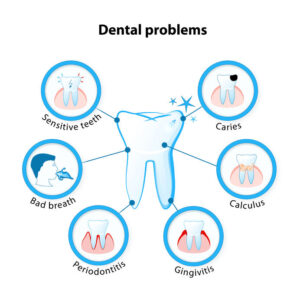July 2, 2024
While it might seem that blood sugar and dental hygiene have little in common, there is a crucial but often overlooked association between diabetes and oral health. This means if you have diabetes, you’re at greater risk for developing dental problems like gum disease and infections. On the other hand, having gum disease can also worsen complications from diabetes by increasing blood sugar levels.
Individuals with diabetes are more prone to oral health issues due to several factors:
· Increased Vulnerability to Infections: Elevated blood sugar weakens the body’s ability to fight bacteria, making individuals with diabetes more susceptible to gum disease (gingivitis and periodontitis). Moreover, gum disease can further elevate blood sugar levels, creating a vicious cycle.
· Delayed Healing: Diabetes can impair the body’s capacity to heal, including oral tissues. This delay can increase existing oral health problems, leading to prolonged discomfort and complications.
· Dry Mouth: Many diabetic medications, along with fluctuating blood sugar levels, can cause dry mouth. Saliva plays a crucial role in neutralizing acids, washing away food particles, and protecting teeth from decay. Reduced saliva production increases the risk of cavities, gum disease, and oral infections.
Nerve Damage: Diabetes-induced nerve damage (neuropathy) can affect oral sensations, leading to difficulty in detecting dental issues such as cavities or gum disease at their early stages. It can also result in loss in taste.

Gum Disease: Periodontal disease, also known as gum disease, is an infection of the tissues surrounding and supporting the teeth. It typically starts with the accumulation of plaque, a sticky film of bacteria that forms on the teeth. If not removed through proper oral hygiene practices such as brushing and flossing, plaque can harden into tartar, leading to inflammation of the gums (gingivitis) and, if left untreated, progressing to periodontitis, which can cause irreversible damage to the gums and bone supporting the teeth.
If you notice these warning signs, seek dental care as soon as possible.
· Gums that bleed when you brush your teeth
· Red, swollen or tender gums
· Gums that have pulled away from your teeth
· A metallic taste or persistent bad breath
· Pus or discharge between your teeth and gums
· Loose or separating teeth
· A change in the way your teeth fit together when you bite
· A change in the fit of partial dentures
Protecting Your Oral and General Health: Fortunately, there are steps you can take to reduce your risk of developing periodontal disease and its impact.
· Maintain good oral hygiene: Brush your teeth at least twice a day, floss daily, and schedule regular dental check-ups and cleanings.
· Manage your diabetes: Monitor your blood sugar levels regularly, follow your healthcare provider’s recommendations for medication and lifestyle modifications, such as adopting a healthy diet and staying physically active.
· Quit smoking: Smoking is a significant risk factor for both diabetes and periodontal disease. Quitting smoking can improve your oral and overall health.
· Be vigilant for signs of gum disease: Keep an eye out for symptoms such as swollen or bleeding gums, persistent bad breath, receding gums, and loose teeth. If you notice any of these signs, seek prompt dental care.
Here are some video links for more information about diabetes and oral health.
Remember, a healthy smile starts from within, encompassing both the body and the mind.
Stay informed, stay healthy!
References:
American Diabetes Association. (2024). Oral Health. https://diabetes.org/health-wellness/keeping-your-mouth-healthy
American Dental Association (January 24, 2022). Diabetes. https://www.ada.org/en/resources/ada-library/oral-health-topics/diabetes
Elizabeth Soutar. (April 1, 2021). Diabetes and your teeth. Diabetes Canada https://www.lib.sfu.ca/help/cite-write/citation-style-guides/apa/websites
Ontario Dental Association. (2024). Gum Disease. https://www.oda.ca/oral-health-basics/oral-conditions-diseases/gum-disease/
Cleveland Clinic. (2024). Oral Health Problems and Diabetes. https://my.clevelandclinic.org/health/diseases/11263-oral-health-problems-and-diabetes
